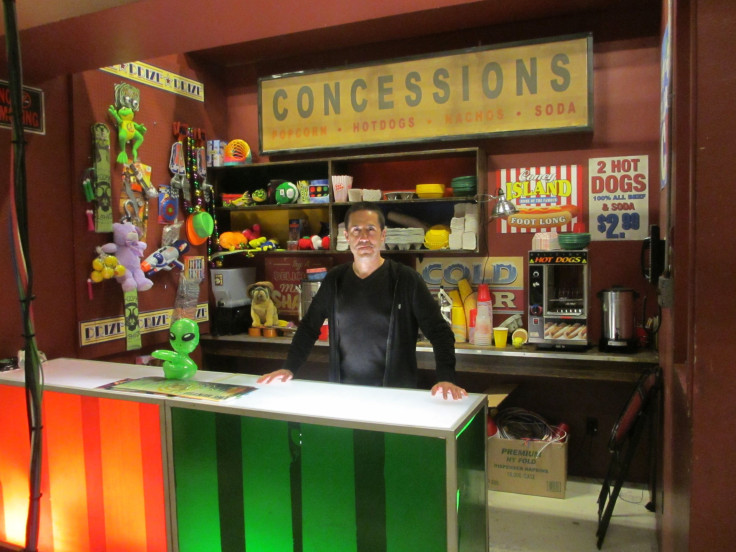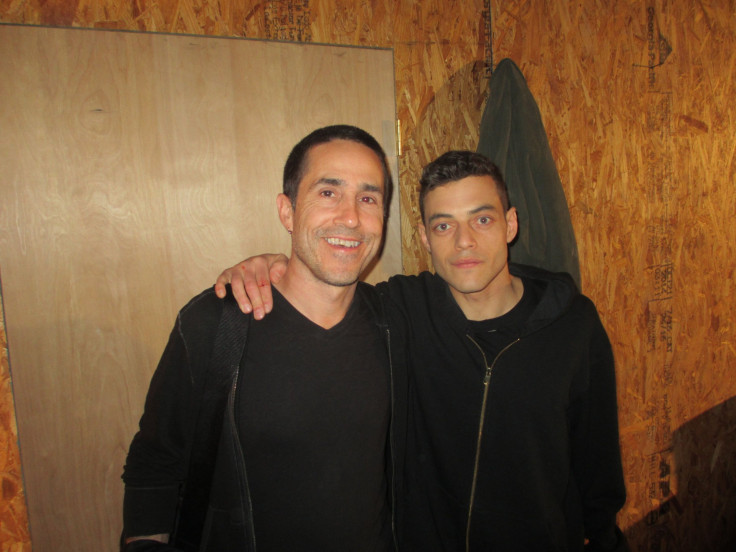'Mr. Robot' Season 1 Finale: Composer Mac Quayle Discusses The Music Behind The Season’s Most Important Moments

[SPOILER ALERT: Contains spoilers from the first nine episodes of the first season of "Mr. Robot."]
Ahead of the first season finale of "Mr. Robot," which airs Wednesday night, composer Mac Quayle spoke with International Business Times about the music underscoring some of this season's most important moments. Quayle also teased what's to come in the finale, saying it was one of the most enjoyable episodes to work on because he "definitely got to take the score [to] a few new places."
The score of "Mr. Robot" is completely electronic. This was a decision Quayle and Sam Esmail, the show's creator, made very early on because they felt it suited the show's subject matter, hacking, a topic it portrays with exceptional accuracy. As they were developing the show's sound, Quayle and Esmail took inspiration from 1980s electronic music.
"Sam really loves music and believes it’s an important part to tell the story," Quayle said. He added that Esmail is very hands on with the music and often comes to his studio to work on the music.
Through the use of dissonance, distorted sounds and low tones, Quayle helps create the show's paranoid, tense and almost schizophrenic ambiance. On "Mr. Robot," the music is loud, making it one of the most essential aspects of the show, which is something that pleased Quayle when he saw the final product.
"It made me feel that what I was doing was going to be heard. That's not always the case," Quayle said. He said he felt the same way when he worked on his Emmy-nominated score for FX's "American Horror Story: Freak Show."
Below, Quayle discusses scoring some of this season's pivotal scenes:
“eps1.0_hellofriend.mov” (Season 1, Episode 1): Elliot (Rami Malek) takes down a child pornographer.
"My job was to really bring some tension into the moment ... Not to be too big, kind of stay out of the way. There’s this slow, pulsing tension sustaining sound. At a certain moment in the scene, it almost turns slightly sentimental as Elliot talks about his father, and then it’s back to the tension … I think the real turning point in the scene is when Elliot says he’s turned him [the child pornographer who owns a coffeeshop] into the police. This is the first time Elliot’s theme is introduced. To me, it feels a little heroic there ... The music turns almost heroic as Elliot walks out of the coffee shop and the police show up."
"eps1.3_da3m0ns.mp4” (Season 1, Episode 4): Elliot going through withdrawal and trying to score drugs.
"I wanted the music to feel somewhat sick and out of it because that’s how Elliot was feeling ... The music just builds and builds as Elliot finally explores the drugs and does the drugs ... It was really harrowing scene, and I wanted the music to try to capture that and just really provide a background for it. I wasn’t scoring any particular moments per se, except there was a constant building in the cue. When the scene reached its conclusion, the cue had built to a kind of a fever pitch and was just very chaotic and very dissonant before it all just collapses."
“ eps1.4_3xpl0its.wmv” (Season 1, Episode 5): The infiltration of Steel Mountain
"There were a lot of twists and turns. It was fun and challenging to work on because it starts off as a little bit of a thriller. Then, it turns into this psychological music as Elliot is trying to manipulate some of the employees inside. Then, he runs into Tyrell and it takes another twist there ... There's this big, dark moment of worry that he’s going to be found out, and then it's back to almost a paranoid thriller as he’s trying to do what he’s ultimately there to do, hack into the climate control system so he can destroy all of the data ... [I used] a lot of synthesizer sounds, pulses, arpeggiators [and] some drones."
“eps1.5_br4ve-trave1er.asf” (Season 1, Episode 6): The prison break, and Elliot finding Shayla’s body in the trunk.
"That was a big moment. We just wanted something that was going to be very dark and heavy ... It’s very dark and distorted. I think it was trying to underscore this huge moment without being too melodramatic. [We were looking for] something that would also compliment the sounds of the sirens that are going off after this prison escape."
"eps1.7_wh1ter0se.m4v" (Season 1, Episode 8): Elliot meets with White Rose (B.D. Wong).
"My job was not to do too much, but to keep the tension underneath and let their dialogue just do all the work. Then, the scene shifts some more and they start talking about this plan and what’s going to happen. The music picks up pace a little bit, still keeping the tension. Finally, the scene ends and Elliot is freaking out, and he goes out onto the street. This theme that got reworked from an earlier episode, the 'Elliot walking down the street freaking out' music, for lack of a better term. He’s kind of losing it. That was another great scene to work on, actually."
“eps.1.7_wh1ter0se.m4v” (Season 1, Episode 8): Elliot hacks himself
"It was a lot of fun scoring the moment when Elliot has the first realization about Mr. Robot ... The music starts glitching ... Glitching sort of represents this perception just being twisted and starting to come apart. I think that’s what it really means to me."

The first season finale of "Mr. Robot" airs Wednesday, Aug. 26 at 10 p.m. ET/9 p.m. CT on USA Network.
© Copyright IBTimes 2025. All rights reserved.






















